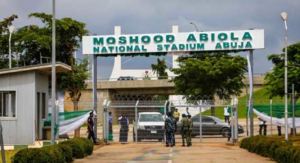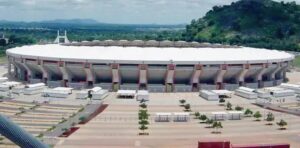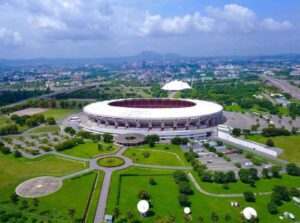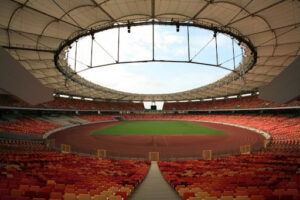Unveiling the Magnificence of Moshood Abiola National Stadium: Emblem of Nigerian Splendor
The Moshood Abiola National Stadium, formerly known as the National Stadium, Abuja, is one of the most iconic landmarks in Nigeria. It is a multipurpose stadium that serves as a home for the Nigerian national football team and hosts various cultural, social, and religious events. The stadium was commissioned in 2000 by the Nigerian government and built on 29 hectares in the west of Abuja. It is a grand venue with a seating capacity of 60,000, offering a range of facilities for spectators.
The stadium is named after Moshood Kashimawo Olawale Abiola, a Nigerian businessman, publisher, and politician who ran for the presidency in 1993. The stadium’s name change was to honor his contributions to the country’s democracy and sports. The Moshood Abiola National Stadium is one of the largest stadiums in West Africa, and its architectural marvel is a testament to Nigeria’s engineering prowess.
The Moshood Abiola National Stadium has a rich historical significance and cultural and social impact on Nigeria. It has been the venue for several national and international sporting events, including the African Cup of Nations in 2000 and the FIFA U-17 World Cup in 2009. The stadium has hosted concerts by international artists such as Beyoncé, Jay-Z, and Usher, making it a hub for entertainment. Its impact on Nigeria’s economy, tourism, and sports cannot be overstated.
Key Takeaways
- The Moshood Abiola National Stadium is a multipurpose stadium that serves as a home for the Nigerian national football team and hosts various cultural, social, and religious events.
- The stadium is named after Moshood Kashimawo Olawale Abiola, a Nigerian businessman, publisher, and politician who ran for the presidency in 1993.
- The stadium has a rich historical significance and cultural and social impact on Nigeria, and it has been the venue for several national and international sporting events and concerts by international artists.
Historical Significance

The Moshood Abiola National Stadium is a multipurpose national sports stadium located in Abuja, Nigeria. It is considered one of the most significant sports facilities in Nigeria due to its historical significance and architectural magnificence.
Construction and Inauguration
The Federal Government of Nigeria approved the contract for the construction of the National Stadium complex and Games Village in 2000. The stadium was designed by Schlaich Bergermann & Partner, a German architectural firm, and constructed by Julius Berger Nigeria Plc., a Nigerian construction company. The construction of the stadium was completed in 2003, and it was inaugurated on October 8, 2003, by the then-president of Nigeria, Olusegun Obasanjo.
The stadium was named after Moshood Kashimawo Olawale Abiola, a prominent Nigerian businessman, philanthropist, and politician. Abiola was a popular figure in Nigeria and was widely regarded as the winner of the 1993 presidential election, which was annulled by the military government. In 2019, President Muhammadu Buhari renamed the stadium after Abiola to honor his contributions to Nigeria’s democracy.
Major Events and Milestones
The Moshood Abiola National Stadium has hosted several major sporting events, including the 8th All Africa Games in 2003, the FIFA U-17 World Cup in 2009, and the 19th National Sports Festival in 2018. The stadium has also been used for other social, cultural, and religious events, including concerts, religious crusades, and political rallies.
The stadium has a seating capacity of 60,491 and features state-of-the-art facilities, including a 400-meter track and field arena, a FIFA-standard football pitch, a swimming pool, a gymnasium, and a media center. The stadium is also equipped with floodlights, making it possible to host night events.
In conclusion, the Moshood Abiola National Stadium is a symbol of Nigerian pride and excellence. Its historical significance and architectural beauty make it a must-visit destination for sports enthusiasts and tourists alike.
Architectural Marvel

The Moshood Abiola National Stadium, formerly known as the National Stadium, Abuja, is a magnificent architectural and engineering marvel. The stadium is designed to accommodate 60,491 spectators covered by a lightweight roof construction. The main characteristics are the two overlapping spectator tiers; the lower tier accommodating 32,000 seats and the upper tier accommodating 28,491 seats. The bowl of the stadium is designed to provide unobstructed views of the pitch from all angles.
Design and Structure
The Moshood Abiola National Stadium is one of the most expensive stadiums ever built in the world. The stadium is designed to meet international standards and host various sporting events such as football, athletics, and basketball. The stadium has a rectangular shape with a length of 290 meters and a width of 270 meters. The playing surface is made of natural grass and measures 105 meters by 68 meters.
The stadium’s design is inspired by the traditional African architecture of the Yoruba people. The stadium’s exterior is adorned with intricate patterns and motifs that reflect the rich cultural heritage of Nigeria. The stadium’s roof structure is made of a lightweight material that reduces the stadium’s weight and allows for more natural light to enter the stadium.
Renovation and Modernization
The Moshood Abiola National Stadium underwent a major renovation and modernization project in 2016. The renovation project was aimed at upgrading the stadium’s facilities to meet modern standards and improve the overall fan experience. The renovation project included the installation of a new sound system, LED floodlights, and a new scoreboard.
The renovation project also included the installation of new seating, VIP boxes, and hospitality suites. The new seating is designed to provide more comfort and legroom for fans. The VIP boxes and hospitality suites are equipped with modern amenities such as air conditioning, televisions, and catering facilities.
In conclusion, the Moshood Abiola National Stadium is a magnificent architectural and engineering marvel that reflects Nigeria’s rich cultural heritage. The stadium’s design and structure are inspired by traditional African architecture, while the renovation and modernization project have upgraded the stadium’s facilities to meet modern standards.
Cultural and Social Impact

The Moshood Abiola National Stadium has had a significant cultural and social impact on Nigeria since its opening in 2003. The stadium is not only a symbol of national pride and identity but also a center for various social, cultural, and religious events.
National Pride and Identity
The Moshood Abiola National Stadium is a source of national pride for Nigerians. The stadium was named after Moshood Abiola, a prominent Nigerian businessman and politician who was believed to have won the annulled 1993 presidential election. The renaming of the stadium after Abiola was a symbolic gesture that honored his contributions to Nigeria’s democracy and served as a reminder of the country’s struggle for political freedom.
The stadium has also served as a venue for major national and international sporting events such as the All Africa Games and the FIFA U-17 World Cup. These events have showcased Nigeria’s athletic prowess and brought international recognition to the country.
Economic and Community Development
The Moshood Abiola National Stadium has contributed to the economic and community development of Abuja and surrounding areas. The stadium provides employment opportunities for local residents and generates revenue through ticket sales, concessions, and merchandise sales.
The stadium has also served as a venue for various social, cultural, and religious events such as concerts, religious gatherings, and political rallies. These events have brought people from different parts of the country and contributed to the cultural diversity of the region.
In addition, the stadium has provided opportunities for local businesses to sell their products and services to visitors and attendees. The economic benefits of the stadium have helped to improve the standard of living for many people in the area.
Overall, the Moshood Abiola National Stadium has had a significant cultural and social impact on Nigeria. The stadium has become a symbol of national pride and identity and has contributed to the economic and community development of the region.
Frequently Asked Questions

What is the seating capacity of Moshood Abiola National Stadium?
The seating capacity of Moshood Abiola National Stadium is 60,491, making it one of the largest stadiums in West Africa. 1
Can you provide the address of Moshood Abiola National Stadium in Abuja?
The address of Moshood Abiola National Stadium is Abuja, the Federal Capital Territory of Nigeria. The exact location is on Abuja-Keffi Expressway, Abuja, Nigeria. 2
What are the accommodation options near Moshood Abiola National Stadium?
There are several accommodation options near Moshood Abiola National Stadium. Some of the popular options include Sheraton Abuja Hotel, Fraser Suites Abuja, and Nordic Hotel. 3
Which is considered the best stadium in Nigeria?
Moshood Abiola National Stadium is considered one of the best stadiums in Nigeria. It is a multipurpose national sports stadium that serves as a home to the Nigerian national football team and hosts various social, cultural, and religious events. 4
Who was responsible for constructing the Moshood Abiola National Stadium?
Moshood Abiola National Stadium was constructed by the Federal Government of Nigeria. The contract for the construction of the stadium was approved by the government in 2000. 1
What was the cost to build the Moshood Abiola National Stadium?
The cost to build Moshood Abiola National Stadium was $360 million. 5
Orther Articles:
Also see: The Iconic Ellis Park Stadium: A Legacy of Sports and Entertainment in Johannesburg
Also See: Stade Du 5 Juillet: A Monument of Sporting Triumphs and Unity in Algeria
Also See: Cairo International Stadium: Egypt’s Iconic Venue for Sports and Culture
Also See: Stade des Martyrs de la Pentecôte: The Heart of Congolese Sport and Culture
Also See: Borg El Arab Stadium: Egypt’s Massive Arena
Tags: Architectural Marvel, Cultural and Social Impact, Frequently Asked Questions, Historical Significance, Unveiling the Magnificence of Moshood Abiola National Stadium: Emblem of Nigerian Splendor